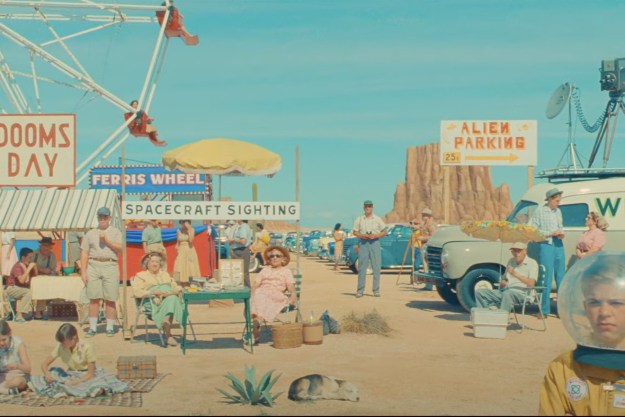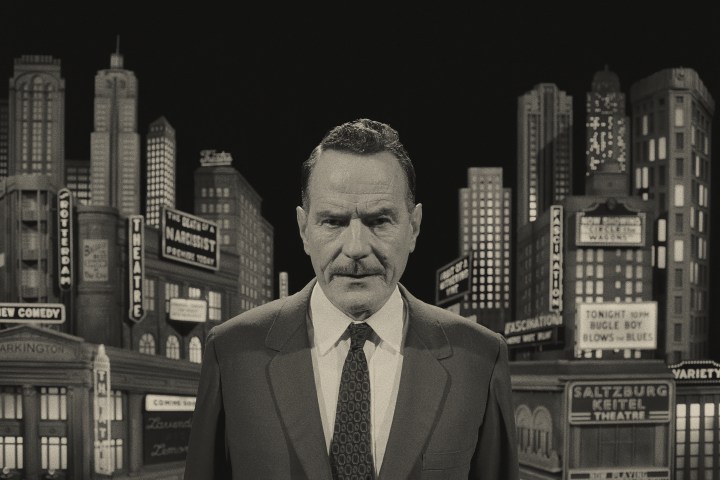
“Asteroid City is an ambitious, dazzling, and occasionally perplexing film from writer-director Wes Anderson.”
- Robert Yeoman's stunning cinematography
- Jason Schwartzman's moving lead performance
- A strong collection of scene-stealing supporting performances
- A labyrinthine plot that's a bit too complicated for its own good
- An abstract structure that keeps certain characters (and their stories) at a distance
Nobody loves a contradiction as much as Wes Anderson. The acclaimed writer-director has built his career telling stories about characters whose lives emotionally oppose their often perfectly manicured settings. Whether it be a hotel concierge whose belief in the power of common courtesy directly contradicts the fascistic political wave of his time or a pair of innocent kids who vow their love to each other even in the face of their adult guardians’ crumbling marriages and heartsick affairs, Anderson’s filmography is populated by all kinds of living contradictions.
There is, perhaps, no filmmaker alive who is better at exploring how our interior and exterior lives can become at odds with each other. It’s no surprise then that his latest film, Asteroid City, focuses on a collection of emotionally lost characters who end up quarantined in a desert town that’s so small it’d be impossible to physically lose your way in — a fact that’s made hilariously clear in an opening 360 degree shot that concisely establishes the entire layout of the film’s central roadside destination. Here, the grand contradiction of Anderson’s characters’ lives is obvious, and not just to us, but to them as well. Their often looney antics are, in turn, brought to gloriously bright, technicolor life here by Anderson and his frequent collaborator, cinematographer Robert Yeoman.
The film’s story focuses partially on a group of parents and kids who travel in 1955 to “Asteroid City,” a one-stop American desert town, for a Junior Stargaze convention that gets surprisingly hijacked by the arrival of an alien presence. What emerges from this plot is not only Anderson’s first real sci-fi effort, but also the most ambitious film he’s made since 2014’s The Grand Budapest Hotel. This time around, the filmmaker isn’t just interested in exploring how we can get turned around in even the most precisely constructed of worlds, but how easily we can find ourselves lost in between the lines of a story, regardless of what our role is in it.

Asteroid City is, like The Grand Budapest Hotel before it, a nesting-doll film. In its black-and-white, Twilight Zone-esque prologue, a TV host (Bryan Cranston) explains that the technicolor events of Asteroid City are not real, but are, in fact, the cinematic visualization of a stage play titled “Asteroid City.” Together, the film’s black-and-white and color sequences recreate not only the play known as “Asteroid City,” but also the creation and production of the play itself. To put that another way: Scarlett Johansson isn’t actually playing Midge Campbell in Asteroid City. She’s playing Mercedes Ford, a Broadway actress who has been hired to play herself playing Midge Campbell.
If this all sounds a bit confusing, that’s because it is, but Anderson doesn’t let the endless layers of Asteroid City drag it down. Before long, its various levels of reality have collapsed in on themselves to the point that the film’s fictional actors and the characters they’ve been hired to play feel interchangeable — except in the rare moments they’re not meant to. Visually, Anderson and Yeoman use the black-and-white palette of the film’s Broadway scenes to separate them from its technicolor sequences, which represent the actual dramatization of Asteroid City’s eponymous play.
Anderson, for his part, uses the production of the film’s fictional play, as well as the play itself, to explore how the artistic process can force one to question oneself and their emotions the same way life can. Here, the filmmaker posits that an actor’s questions about their role ultimately aren’t all that different from the questions we ask ourselves in moments of overwhelming confusion and grief. It’s a testament to how well Anderson pulls this trick off in Asteroid City that, when one character suddenly asks “Am I playing him right?” aloud, it’s initially unclear whether it’s one of the film’s Broadway actors questioning their performance or a grief-stricken father wondering how badly he’s failing his kids.

At the center of Asteroid City’s play-within-a-play-within-a-teleplay is Augie Steenbeck (Jason Schwartzman), a war photographer who journeys with his three daughters and son, Woodrow (Jake Ryan), to Asteroid City so that Woodrow can participate in the town’s annual Junior Stargazer convention. While there, Augie tells his kids that their mother passed away three weeks prior and that he hasn’t had the nerve to tell them since then. In the days that follow, Augie not only reunites with his father-in-law (A Man Called Otto‘s Tom Hanks), but also strikes up an unexpected romance with Johannson’s Midge, a popular movie star who arrives in Asteroid City with her daughter, Dinah (Grace Edwards), another Junior Stargazer.
Everything goes a bit haywire for everyone in Asteroid City when they witness an unprecedented alien event, which causes the government forces present in town (led by Jeffrey Wright’s hilariously uptight General Grif Gibson) to place them under a mandatory quarantine. Plenty of typically Andersonian comedic gags follow, including an argument involving a death ray and a disgruntled father (Liev Schrieber, at his most gloriously irritable) that prompts a marvelously funny line reading from Hanks. Along the way, Anderson also packs in enough moments of awkward flirtation and youthful curiosity to make Asteroid City his most sweetly romantic film since 2012’s Moonrise Kingdom.
As humorous as much of Asteroid City is, it’s Schwartzman who ensures that the film doesn’t stray too far from the Earth. One of Anderson’s oldest and most reliable performers, Schwartzman is given the chance here to join his director’s long list of wounded, emotionally distant father figures. With his often glazed eyes and monotonal line delivery, Schwartzman plays Augie as a man who feels profoundly untethered from the life he once had, which only makes the character’s shared grief with Hanks’ acerbic Stanley all the more tragic. Their sympathetic, contradictory dynamic is illustrated best in one early scene when Augie tells Stanley that he hasn’t told his kids about their mother’s death because “the time is never right.” Stanley, in response, tells him, “the time is always wrong.”

Anderson props up Schwartzman with a bevy of note-perfect supporting performances, specifically those given by Johansson, Hanks, Wright, Tilda Swinton, and Margot Robbie, who shows up in just one scene, but gives a clutch hitter performance for the ages. While not everyone in Asteroid City is quite as unmoored as Schwartzman’s Augie, they’re all searching for answers about themselves that they may never find. Midge, for instance, wonders aloud at one point whether her habit of playing depressed, suicidal characters stems from the fact that she herself is depressed and suicidal or that she isn’t. Asteroid City doesn’t reveal whether Midge ever solves that riddle, and her questions aren’t the only ones that go unanswered in the film.
Here, Anderson seems less interested in the answers to his characters’ situations than he does in the questions that plague them. In Asteroid City, the filmmaker embraces the unknowability of certain mysteries, insisting that uncertainty should never be a barrier to entry. “Trust your curiosity,” Swinton’s adult scientist says to one of the film’s Junior Stargazers during a key scene, bridging the gap between Asteroid City’s space age setting and its introspective story of life in transition. Later, when a group of actors all proclaim that “you can’t wake up if you never fall asleep,” Asteroid City’s interest in our lives’ various detours and pit stops becomes vibrantly clear.
In typical Anderson fashion, Asteroid City’s characters aren’t afraid to look each other in the eye. But looking at others isn’t nearly as difficult as turning that same unblinking gaze upon ourselves. Asteroid City knows this. It also knows that self-reflection, no matter how painful, is necessary. Even if we never find any satisfactory answers to the questions we have about ourselves and the universe, Asteroid City argues that there is value in searching for them, the same way there is value in losing and getting lost. Sometimes, the mere act of returning to oneself is reward enough. After all, you can’t get started again if you never stop, and you can’t wake up if you never fall asleep.
Asteroid City is now playing in theaters.
Editors' Recommendations
- The 10 best movies of 2023, ranked
- The 10 best Wes Anderson characters, ranked
- Is Asteroid City streaming?
- Vesper review: an imaginative sci-fi adventure
- Meet Cute review: Peacock’s time travel rom-com falls flat




